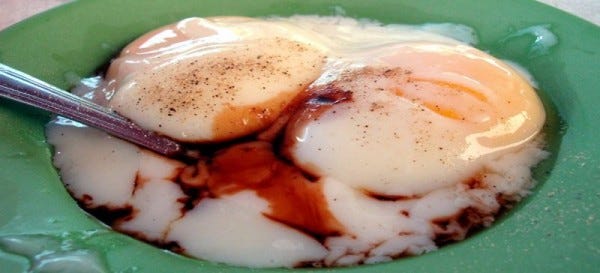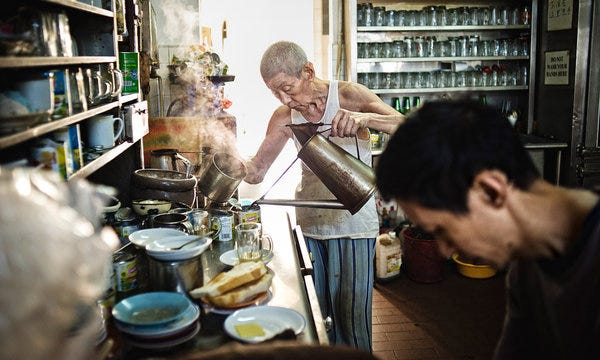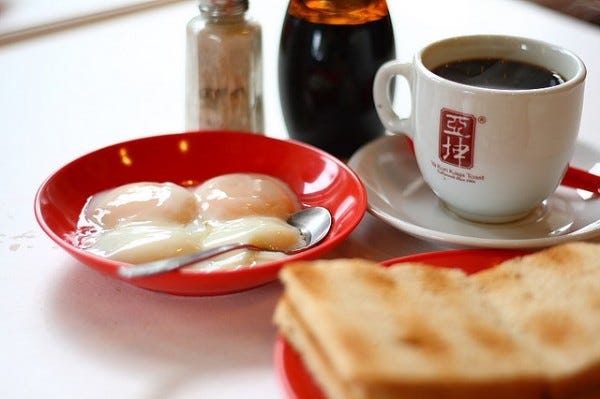Originally posted on Poached Mag.
I was having kopi with some friends at Ya Kun Kaya Toast. A friendly auntie spoke to us in cheery Singlish as she cleared our table. Someone remarked later that Ya Kun feels really “authentic” — not just because of the familiar butter-roast of the arabica beans, but because of aunties like her.
After all, coffee shops these days employ cheaper foreign labour. We can’t blame them for that when the cost of everything is rising. But foreigners don’t always speak English, and they rarely ever speak Singlish. It’s frustrating to buy coffee sometimes, you know? Sometimes it feels like your country isn’t yours anymore, unless you’re in Ya Kun.

I found myself nodding in agreement. But then I got thinking about this “authenticity”. What is it, exactly? Wikipedia says…
Authenticity refers to the truthfulness of origins, attributions, commitments, sincerity, devotion, and intentions.
That sounds nice until you remember that truth is a very subjective thing. We often take something to be true not because it’s actually true, but because we’d like it to be. We just need it to feel authentic enough so that it doesn’t bother us.
“Authentic” can be a political weapon.
When we claim something to be authentic, we imply that whatever remains, by contrast, is inauthentic. The coffee shop at my void deck might be considered “inauthentic” compared to Ya Kun because it hires foreigners. They weren’t born here. They weren’t raised here.
But this is what Singapore is today. Migrant workers have always been a part of it. Ya Kun’s founder, Loi Ah Koon, was a migrant worker himself. Yet we hardly see migrant workers in our glossy (and authentic?) National Day videos. I wonder why?
Who gets to decide what is or isn’t authentic?
What if some old coffee shop uncle came along, cleared his throat and spat at Ya Kun for “selling out”? Would his word (or phlegm) count for anything?
Or is it up to the consumers? And if so, which consumers? If The New York Times wanted to do a piece about Singapore’s coffee culture, would you bring them to Ya Kun, or to your local PRC-staffed coffee shop under your HDB block? Which one would you choose?

Actually, the NY Times DID do a piece on Singapore’s kopitiams. The bulk of the attention was given to Heap Seng Leong Kopitiam at North Bridge Road, which is by any measure even more authentic than Ya Kun. The uncle there still wears singlets!
Ya Kun was described as a successful “McDonaldization” of kopitiams. Which… kinda sounds like an insult. Nobody would cite McDonald’s as an authentic part of their local culture. But that doesn’t mean that McDonald’s can’t be a meaningful member of the community. Ya Kun has a valid place in today’s kopi-ecosystem, whether we like it or not. (I personally like it.)
Is authenticity just about nostalgia?
Whoever commoditizes the past most effectively… wins? That’s what we’re paying for, more than the kopi itself. To be brought “back to the good old days” for a few moments before we get back to work. To a past that exists primarily in our reconstructed memories.
Memories are always reconstructed, not retrieved, so they’re heavily influenced by our present circumstances. A couple of decades ago, a regular kopitiam might’ve been considered embarrassing, clunky, old-fashioned.
Today, patronising one shows that you have “culture”. You might even bring your forward-thinking angmoh business partners to Heap Seng Leong. (Featured in New York Times, you know!) But you probably wouldn’t bring them to the coffeeshop under your block.
A little too real, maybe.

As a Sunday Times article back in 2010 put it, there’s no way that Ah Koon would’ve imagined his small-time coffee stall at Telok Ayer Basin would become regionally synonymous with kaya toast, half-boiled eggs and hot, creamy kopi. He would never have imagined that a bunch of geeks would be attempting to debate the philosophy of authenticity over his coffee (and that one of them would then write an article about it on the Internet).
But then and again, it was his can-do, entrepreneurial spirit that got him started, so he probably would’ve approved of how it all turned out. Especially considering the dedication to quality — staff members might go through a few hundred eggs before they start making them good enough to meet Ya Kun’s standards. The company also has a wonderful no-questions-asked exchange policy.
This commitment to quality is something that remains “authentic”, even if we’re having our kopi in the air-conditioned comfort of futuristically named Fusionopolis instead of rustic Telok Ayer Basin with the gruff singlet-wearing uncles and grating plastic chairs.
In the end, maybe authenticity is a weasel word we use for quality.
It’s like “Be yourself”, which we say when we really mean “be comfortable and likeable.” Maybe “authentic” is simply a way of saying “really good”.
Because otherwise either everything is authentic, or nothing is.